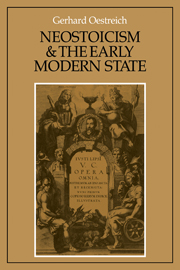Book contents
- Frontmatter
- Contents
- Foreword
- Introduction
- PART I JUSTUS LIPSIUS AND THE NETHERLANDS MOVEMENT
- 1 Constantia in publicis malis
- 2 The political intent in Neostoic philosophy
- 3 The main political work of Lipsius
- 4 Political Neostoicism
- 5 The military renascence
- 6 The European echo
- 7 The Netherlands movement in Brandenburg-Prussia
- PART II THE CONSTITUTIONAL DEVELOPMENT OF THE EARLY MODERN STATE
- Index
1 - Constantia in publicis malis
Published online by Cambridge University Press: 04 May 2010
- Frontmatter
- Contents
- Foreword
- Introduction
- PART I JUSTUS LIPSIUS AND THE NETHERLANDS MOVEMENT
- 1 Constantia in publicis malis
- 2 The political intent in Neostoic philosophy
- 3 The main political work of Lipsius
- 4 Political Neostoicism
- 5 The military renascence
- 6 The European echo
- 7 The Netherlands movement in Brandenburg-Prussia
- PART II THE CONSTITUTIONAL DEVELOPMENT OF THE EARLY MODERN STATE
- Index
Summary
In 1584 there appeared a small volume entitled De constantia libri duo qui alloquium praecipue continent in publicis malis. Its author, Justus Lipsius, was one of the luminaries of Dutch humanism, a professor of Leiden University, and already renowned throughout Europe for his edition of Tacitus and his commentary on his works. His little book on constantia found a wide and surprisingly rapid response among contemporary readers and proved to be an international best-seller. It was printed forty-four times in the original Latin, fifteen times in French translation, and it was also translated into Dutch, English, German, Spanish, Italian and Polish. Altogether it went into over eighty editions between the sixteenth and eighteenth centuries. It is a work of moral philosophy with a humanist foundation, a prescription for the behaviour of the individual in the state, society and politics, that public domain of which, from the earliest times, man has only too often felt himself to be a victim rather than a denizen.
The starting point for Lipsius' book is the actual state of civil war and the almost unbearable conditions in his own country, the Netherlands. The author presents himself as being on his way to Vienna (as in fact he had been twelve years earlier, in 1572), having decided that he can no longer go on living in Louvain, his old university town. Breaking his journey at Liège, he stays with a friend, the humanist canon Langius (Lang), who rouses him from his despondency and directs his mind to the teachings of philosophy.
- Type
- Chapter
- Information
- Neostoicism and the Early Modern State , pp. 13 - 27Publisher: Cambridge University PressPrint publication year: 1982

